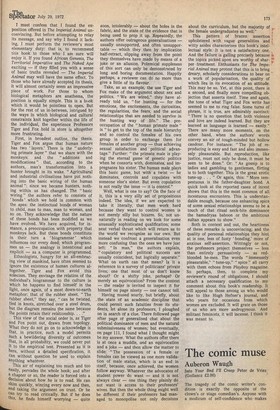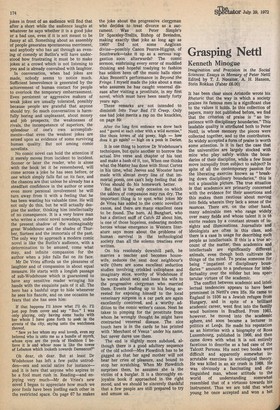The comic muse
Auberon Waugh
Into Your Bed I'll Creep Peter de Vries (Gollancz £2.00) The tragedy of the comic writer's condition is exactly the opposite of the clown's or stage comedian's. Anyone with a modicum of self-confidence who makes jokes in front of an audience will find that after a short while the audience laughs at whatever he says whether it is a good joke or a bad one, even if it is not meant to be funny at all. Something about an assembly of people generates spontaneous merriment, and anybody who has sat through an evening of comedy at Butlin's will have understood how frustrating it must be to make jokes at a crowd which is not listening to you and is already convulsed with laughter.
In conversation, when bad jokes are made, nobody seems to notice much. Sufficient benevolence is generated by the achievement of human contact for people to overlook the temporary embarrassment. Even persistent or aggressive makers of weak jokes are usually tolerated, possibly because people are grateful that anyone should try. So much conversation is harmfully boring and unpleasant, about money and job prospects, the weaknesses of rivals, the incompetence of superiors, the splendour of one's own accomplishments—that even the weakest jokes are seized upon as evidence of some surviving human quality. But not among comic novelists.
No comic novel can hold the attention if it merely moves from incident to incident. Sooner or later the reader, who is alone with the book let it be remembered, will come across a joke he has seen before, or one which simply falls flat on its face, and the chances are that unless he already has a steadfast confidence in the author or some even more personal involvement he will turn away from it with a feeling that he has been wasting his valuable time. He will not only do this, but he will actually despise the author, thinking him intellectually of no consequence. It is a very brave man who writes a comic novel nowadays, under the present shadow of the unimaginably great Wodehouse and the shades of Thurber, Surtees and the immortals of the past. The only way to approach a modern comic novel is like the Butlin's audience, with a determination to be amused, come what may, and infinite compassion for the author when a joke falls flat on its face.
Mr De Vries affords us the pleasures of laughter and of compassion in about equal measure. He starts with a longish passage of sub-Wodehouse which is guaranteed to have any sensitive reader wringing his hands with the exquisite pain of it all. The hero has a bashful urge to hide whenever he sees his fiancee, and on one occasion he fears that she has seen him: If that happens I'll know what I'll do. I'll just pop from cover and say "Boo." I was only playing, only having some hacks with her whom I have gone forth to seek in the streets of the city, saying unto the watchmen thereof,
"Saw ye her whom my soul loveth, even my beloved who is unto me as a bundle of myrrh, whose eyes are the pools of Heshbon I believe it is and whose nose is like the tower of Lebanon which looketh towards Damascus?"
Oh dear, oh dear. But at least Dr Wodehouse has left a few paths untrodden—sex and social satire for instance— and it is here that anyone who aspires to be a fool must rush in. Reading—and enjoying very much—Mr de Vries's new novel I began to appreciate how much we poor fools have been jostling each other in the restricted space. On page 67 he makes the joke about the progressive clergyman who decides to treat divorce as a sacrament. Was not Peter Simple's Dr Spaceley-Trellis, Bishop of Bevindon, making exactly that joke as long ago as 1960? Did not some Anglican divine—possibly Canon Pearce-Higgins, of Southwark—take it up as a serious suggestion soon afterwards? The comic sermon, enshrining every error of muddled thinking and hopeful toadying to fashion has seldom been off the music halls since Alan Bennett's performance in Beyond the Fringe. I myself made the joke about a man who assumes he has caught venereal disease after visiting a prostitute, in my first novel, which must have been nearly forty years ago.
These remarks are not intended to diminish into Your Bed Creep. Only one bad joke merits a rap on the knuckles, on page 89:
After the long first embrace we drew back and "gazed at each other with a wild surmise," like those lovers of old poesy, high — how does it go again? — high on a peak in Darien.
It is one thing to borrow Dr Wodehouse's techniques, but quite another to borrow the actual live verse and chapter of his text and make a hash of it, too, When one thinks what the Master has done with Stout Cortez in his time, what Jeeves and Wooster have made with almost every line of that immortal poem, one can't help feeling that de Vries should do his homework better.
But that is the only occasion on which the udders of compassion may run dry. The important thing is to spot what jokes Mr de Vries has added to the comic novelist's canon, and there are many excellent ones to be found. The hero, Al Banghart, who has a distinct sniff of Catch 22 about him, is one of those hopeless, endearing modern heroes whose emergence in Western literature says more about the problems of human survival in the technological society than all the solemn treatises ever written.
On his resolutely downhill path, he marries a teacher and becomes housewife, seduces the next door neighbour's wife (there are some excellent seduction studies involving crinkled cellophane and imaginary mice, worthy of Wodehouse if he wrote about sex) and loses his wife to the progressive clergyman who married them. Events leading up to his being arrested for exposing himself to the local veterinary surgeon in a car park are again excellently contrived, and a worthy addition to the comic writer's canon. Next he takes to pimping for the prostitute from whom he wrongly thought he might have contracted venereal disease. The nice touch here is in the cards he has printed with 'Merchant of Venus' under his name, but never dares use them.
The end is slightly more subdued, although there is a good adultery sequence of the old school—Mrs Plowditch has to be gagged so that her aged mother will not hear her cries of pleasure, and bound to stop her scratching. When Mr Plowditch surprises them, he assumes she is the victim of a burglar. It is a thoroughly enjoyable book if approached in the right mood, and we should be sincerely thankful that a few people are still prepared to try and amuse us.









































 Previous page
Previous page